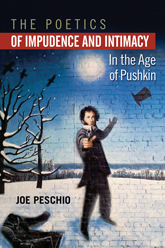|
The Poetics of Impudence and Intimacy in the Age of Pushkin
Joe Peschio
Publications of the Wisconsin Center for Pushkin Studies
David M. Bethea and Alexander Dolinin, Series Editors
“One of the most engaging, yet understudied, aspects of Russia’s ‘golden age’ is the playfulness of its verse, prose, and familiar letters. Peschio brings conceptual power, scholarly rigor, and an appropriately light touch to this important but elusive topic. An absolutely indispensable study of the creative irreverence of the Pushkin period.”
—William Todd, Harvard University
In early nineteenth-century Russia, members of jocular literary societies gathered to recite works written in the lightest of genres: the friendly verse epistle, the burlesque, the epigram, the comic narrative poem, the prose parody. In a period marked by the Decembrist Uprising and heightened state scrutiny into private life, these activities were hardly considered frivolous; such works and the domestic, insular spaces within which they were created could be seen by the Russian state as rebellious, at times even treasonous.
Joe Peschio offers the first comprehensive history of a set of associated behaviors known in Russian as “shalosti,” a word which at the time could refer to provocative behaviors like practical joking, insubordination, ritual humiliation, or vandalism, among other things, but also to literary manifestations of these behaviors such as the use of obscenities in poems, impenetrably obscure allusions, and all manner of literary inside jokes. One of the period’s most fashionable literary and social poses became this complex of behaviors taken together. Peschio explains the importance of literary shalosti as a form of challenge to the legitimacy of existing literary institutions and sometimes the Russian regime itself. Working with a wide variety of primary texts—from verse epistles to denunciations, etiquette manuals, and previously unknown archival materials—Peschio argues that the formal innovations fueled by such “prankish” types of literary behavior posed a greater threat to the watchful Russian government and the literary institutions it fostered than did ordinary civic verse or overtly polemical prose.
Joe Peschio is associate professor of Russian and coordinator of the Slavic languages program at the University of Wisconsin–Milwaukee.
Praise
“Theoretical approaches are handled with deftness and grace. . . . Peschio is also an exemplary archival scholar, scrupulous in his thoroughness and imaginative in the connections he is able to make among seemingly disparate discoveries. . . . Should be required reading for anyone with a serious interest in the literature, society, and culture of early nineteenth-century Russia.”
—Slavic and East European Journal
“A model of exacting scholarship—often written, appropriately, with a witty tongue in cheek.”
—Slavic Review
“Original, imaginative, well researched, convincingly argued, and excellently written. This book fills an important lacuna in the history of Russian literature and culture of the early nineteenth century.”
—Irina Reyfman, author of Ritualized Violence Russian Style: The Duel in Russian Culture and Literature
Of Related Interest
|

Taboo Pushkin
Topics, Texts, Interpretations
Edited by Alyssa Dinega Gillespie |
|

January 2013
LC: 2012010173 PG
174 pp. 6 x 9
|

